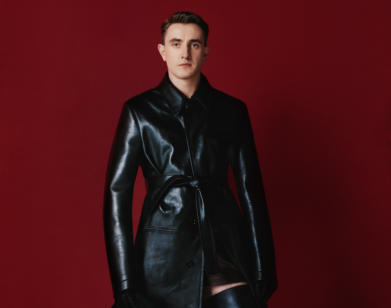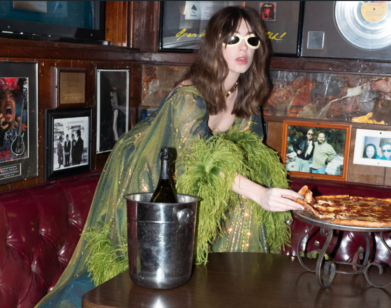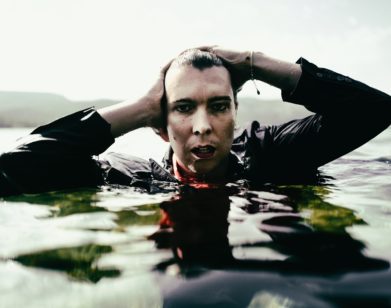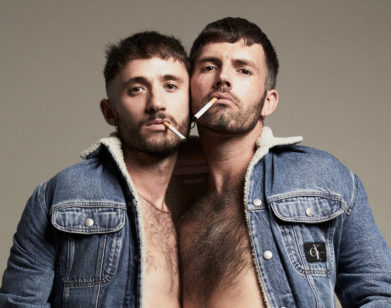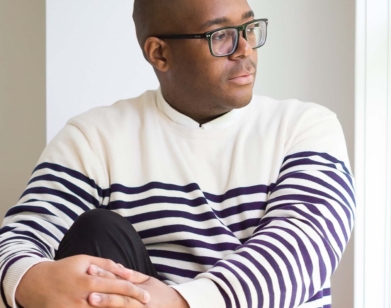In Conversation
Jemima Kirke and Alison Oliver on Giving Interviews and Getting Naked
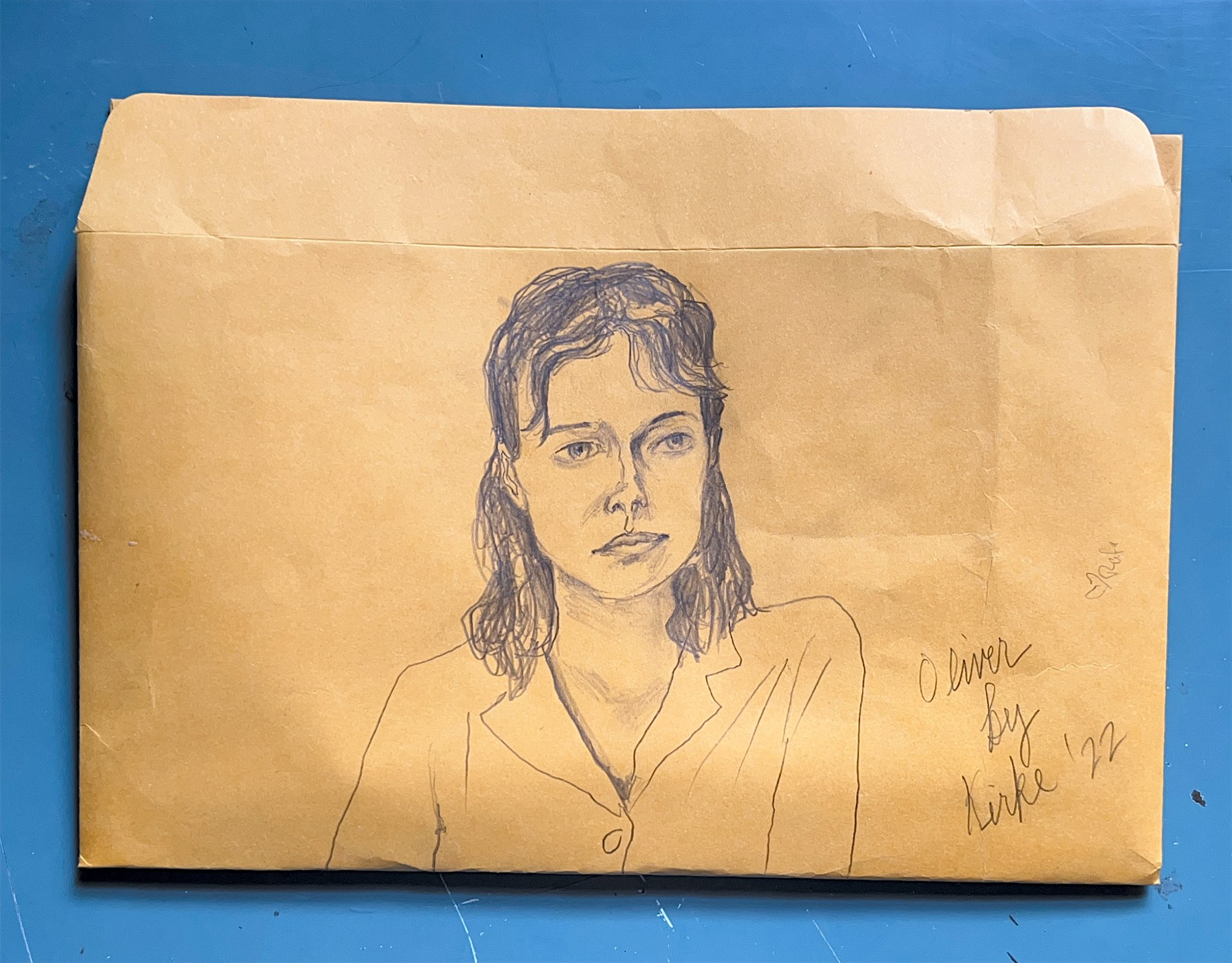
Alison Oliver by Jemima Kirke.
Jemima Kirke and Alison Oliver star as the romantically-entwined Melissa Conway and Francis Flynn in the Hulu adaptation of Sally Rooney’s debut novel, Conversations with Friends. The show arrives on the heels of last year’s equally brooding miniseries Normal People, also based on a book by Rooney. Kirke shot to stardom playing the sexually adventurous Jessa on Lena Dunham’s Girls, and recently starred in the third season of Netflix’s Sex Education as a sexually repressed school principal. By contrast, Conversations with Friends is Oliver’s first project out of drama school—she learned she got the part the morning after her graduation from Trinity College. To mark the occasion, Kirke sat down with Oliver to offer a few industry-veteran tips on interview etiquette, and to discuss the act of baring your heart (and body) on screen. —CAITLIN LENT
___
JEMIMA KIRKE: Hi. I love our little red carpet discussions.
ALISON OLIVER: I know, it’s so helpful. It’s like a little skill of its own, isn’t it?
KIRKE: It is, and that’s why I look at the pictures from last night, because I’m like, “Okay, how can I fix this for next time?”
OLIVER: How did you find last night, being around people who had seen it?
KIRKE: First of all, it was so nice to socialize. Not that I haven’t been doing it lately, but I haven’t walked into a room full of strangers in so long, and I actually love it. I had a lot of good conversations. I keep hearing people talk about the pacing, like how slow and how sort of quiet the energy of it is.
OLIVER: I don’t know if it felt that slow when we were doing it. When you’re in it, there’s so much space for those beats and that silence.
KIRKE: On this TV show, what really helped me acting-wise was that I started asking myself before each scene, “Why is this scene here?” It’s a question I realized I should be asking for everything I do, but this one really pushed me to do it because what the scene was about is somewhat buried—we had to bring it out.
OLIVER: Were there any particular scenes where it felt difficult to do that, to find the “why?”
KIRKE: There were none that I couldn’t figure out in the end. The scene where I bring you guys into the house for the first time, I realized there were a couple things like that, where it’s actually about you again. [Both laugh]
OLIVER: Do your alter ego!
KIRKE: I’ll find a moment for it, but she’s there all the time. For the record, I have an alter ego that resents that Alison is number one on the call sheet.
OLIVER: Didn’t we name her?
KIRKE: Lauren, I think. Did you have to ask yourself the “whys” to fully understand the purpose of your scenes, or was it just something that came naturally to you as you were reading?
OLIVER: In the book, she justifies everything all the time. Even though she’s such an insecure person, she tries to justify all her reasons or motivations throughout the story. So, even if I was struggling with some of her decisions, or say, if she’s being a particular way, even if I have to stretch to understand why she’s doing that, I always felt like she knew, in a sense.
KIRKE: And in the book, you have her in a monologue for every scene, and you were an avid student of the book. But for me, it wasn’t just figuring out the purpose of the scene, but it was also figuring out the purpose of me being in the scene. It could have been you being brought into the house in another moment, in another way, but I think it expanded on our dynamic. I realized that moment was also probably a moment of embarrassment for me. It’s another example of how I am inauthentic.
OLIVER: That’s definitely such a big function of that scene, showing the class differences and the age differences as well, and how our characters are from such different worlds almost from the beginning. I feel like we were so spoiled on the show with Lenny [Abrahamson] and how much he interrogates every scene and every line.
KIRKE: I’m glad you realize that this was unusual, how much attention Lenny gave to the acting.
OLIVER: It was so amazing. You could knew that he was tracking each person’s journey and each moment, and nothing would go unnoticed. As an actor that’s so reassuring. I have a fond memory of when we were in Croatia and there was a scene where I think Nick had just said to Francis, “Well, I still love Melissa.” Then they end up going to the market together. We were talking loads about what he meant by that and Lenny just kind of stopped and was like, “Sorry guys, I need to figure out who’s gotten the fish, because the reason we’re going to the market is because we’re getting fish.” Everything has to feel so real.
KIRKE: The fact that he sort of forgot for a moment about who’s getting the fish, there are some directors who would be more interested in that continuity than the tension in the scene. You’re doing so many things as a director and you would think that directors would be more obsessed with the acting, but it’s a luxury to be able to be so focused on the acting because you have so many things to think about. Somehow, he’s able to do it all in his head.
OLIVER: It’s that no-stone-left unturned quality in him.
KIRKE: How have you found the press side of things? You started in the deep end with this show, in terms of exposure. What is that like for you?
OLIVER: I really enjoy just getting to talk about the show, because it is so complicated and because there are so many different elements to it. I get really interested in all the different things that people have taken from it so far. It’s almost like an interesting sub-plot to your job as an actor. You go and you play the part, you go to set, and you film it, and then this side of things is running alongside it.
KIRKE: One aspect of the interview process is that they just want to get it done, right? Sometimes your publicist or the producer is watching and it’s like, “You know this was supposed to be a five minute interview, or we’re only supposed to be talking about this part? This journalist is getting a lot more than they deserve right now.” But I agree with you. I love talking about it, so I could go for ages. I have this publicist, she was like, “Why are you giving them this? You answer the question and move on.” When I’ve done fuck ups where I’m embarrassed, before it comes out, I’ll try and get a hold of the [writer]. It’s not that hard. You write to your publicist or your agent and they’ll give you the number. I did it the other day, actually. I said something that I’ve said so many times that I was embarrassed. I was like, “I just have to do some damage control here. Just don’t put this part in.” They were like, “We really liked that part.” I was like, “I like it, too, obviously, because I say it all the fucking time.”
OLIVER: It’s almost like when you get into that rhythm with yourself. I’ve done it so many times already. Your voice almost goes into a tone, and you go into autopilot.
KIRKE: I mean, you’re talking about the same subject 48 times. You’ll say some of the same shit. It’s going to be impossible to think of different things for everyone. The art is just figuring out an angle that’s a little bit different. Andy Warhol, who is apropos for this interview, was fascinated with interviews and was the first person to really turn them on their heads. He treated interviews like performance art. He would find ways to turn the interview around on the journalist, and figure out a way to get the interview to reveal more about them than it did about him. I’m Your Mirror is a collection of all his interviews and they’re really funny. I’ve stolen some things from there.
OLIVER: There was an interview that you showed me of someone interviewing Lady Gaga. Who was it?
KIRKE: Howard Stern.
OLIVER: Yes, he does a brilliant one with Robert Pattinson as well.
KIRKE: He has a bad reputation, because he went through a phase where he was really obsessed with porn stars and sex workers and strippers. In the ‘90s it came off as perverse and gross, which at times it was. He would have them do gross competitions and they would come in at like five in the morning when the radio show starts and they’d been up all night. He doesn’t really do that anymore, but his interviews with celebrities always made me like that celebrity more after.
OLIVER: It’s so interesting how he can have that effect.
KIRKE: Because he gets them to be vulnerable. The only thing that ever makes me not like a celebrity from an interview is if they feel like they’re full of shit, like they’ve got their head up their ass or something, and he manages to bring it out.
OLIVER: How important is it to you, with interviews and stuff, to keep a little bit of yourself? Even if you are speaking to someone, and you feel like you’re vibing with them, do you always kind of have that thing of like, “Oh, be careful!”
KIRKE: Yeah, and I’ve learned my lesson because I’ve done so many of them now and I never kept my cards close to my chest. I was always like, “I’m not a private person. Why would I not just talk freely?” A lot of times the conversation is really pleasant and sometimes even enlightening, but you forget that this is not about the other person and their side of the conversation. The journalist is not going to be in the interview, and this is all about you, so they can say whatever the hell they want. In fact, the more revealing they are, it helps their article. I have had to dial back some of the candidness because there were things I’ve said that I didn’t think they would put in. It just didn’t seem like it was part of the interview itself. I told them about how I met my ex-husband, which I didn’t think was noteworthy, but apparently it was really noteworthy because I said it once and it’s everywhere, that I met him in rehab. Just be aware.
OLIVER: That’s really good advice. I love that we’re doing an interview about interviews.
KIRKE: Let’s talk about the show again. How did you feel about doing nudity on the show? What was your first thought when you read it? Were you aware that was going to be a thing?
OLIVER: Yeah, because it’s the same team behind Normal People and they were so honest in that way of really showing nudity that I definitely knew that was something I would be doing. It feels necessary for that character, so it feels justifiable in my head. It never felt gratuitous. Of course, those things can be nerve wracking, and I definitely initially felt a bit like, “Oh, am I going to feel really self-conscious?” But just immersing yourself in your character’s story, you’re able to hide behind your character, if that makes sense. This is their body. This is their thing. I’m telling the story of her body.

